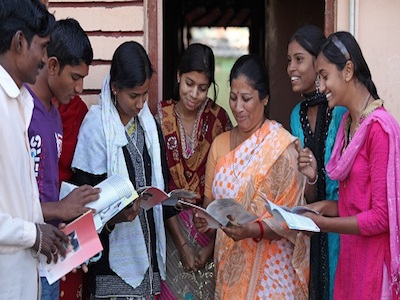Cover image: © UNICEF/2011-00067/CrouchIndi
Background
Communication for Development is a an evidence-based process that utilizes a mix of communication tools, channels and approaches to facilitate participation and engagement with children, families, communities, and networks for positive social change in both development and humanitarian contexts. It draws on learning and concept from social, behavioural and communication sciences. While the understanding and application of C4D principles and methodologies has been steadily rising, the field has also been evolving rapidly in recent years. Factors such as changing demographics, globalization, conflicts, climate changes, cross-border migration, and rapid urbanization have posed both challenges and opportunities for the global development and communication sectors. Development agendas have become more complex as underlying economic, environmental, cultural and political factors have impacted the reach and sustainability of development programmes and stressed the need for integrated approaches rooted in social and behavioural sciences. At the same time, the human rights-based approach to development has emphasized the need to address difficult, multi-layered and structural issues such as violence, abuse, exploitation, stigma, discrimination, inequities and social exclusion. The past decade has witnessed rapid changes in both communication approaches and channels used to connect people, provide access to knowledge, and share and discuss ideas and information. UNICEF’s C4D Global Learning course, delivered in 2018 in partnership with University of Hyderabad, India, reflects these rapid changes and the need for new and enhanced communication competencies to achieve behavior and social change to improve the lives of children.
Learning Objectives
The C4D course is designed to help participants:
- Understand key theories around communication, development, culture, behavior and social change; human rights principles including inclusion and equity; and C4D concepts, approaches, methods and techniques
- Apply this knowledge to analyze root, structural and direct causes; and generate insights related to behavior and social change components of UNICEF’s work
- Provide guidance in the application of processes and principles of C4D research, design, implementation and management, monitoring and evaluation to UNICEF programming and humanitarian actions
- Guide, manage and facilitate the design and development of effective, small and large scale C4D strategies and interventions for behavior change and social transformation that nurture evidence, and promote the principles of human rights, social inclusion and accountability
- Lead and manage partnerships in this area of work, through harnessing the potential and creativity of counterparts, formal and informal national and community based networks, as well as advocating for mainstreaming of C4D within development programmes, policy advocacy and humanitarian action.
Course Structure & Duration
The Global C4D Learning Course is a blended learning course consisting of three components:
Online Component: An interactive online learning course that addresses core concepts in C4D theory, programme planning and research. To qualify to attend the face-to-face workshop, participants must successfully complete the online course prior to the face-to-face workshop. The course takes approximately 20-25 hours to complete.
Written Assignment: Participants will complete a brief writing assignment that helps them to apply concepts from the online course to a particular aspect of C4D programming.
Face to Face Workshop: A face-to-face workshop at the University of Hyderabad, India in which participants will apply online learning concepts through group activities, including a field project with civil society groups working in UNICEF’s Strategic Plan areas.
Who Will Benefit:
The Global C4D Learning Course is relevant to mid-level and senior staff in Programmes, C4D, Communication, Emergencies, Social Policy, Planning, Monitoring and Evaluations
Dates and Location:
Course Fees
This year, C4D HQ will subsidize 50% of the course fee, for a total discounted cost of USD 1,100 per participant. Details about the payment modality of the course fees will be send to those selected to participate.
Travel and DSA
Participants should arrange to have the course fee and their travel expenses and DSA for the full face-to-face workshop period covered by their respective offices as part of learning and development.
APPLICATION DEADLINE: June 15, 2018
Contact Details
Charlotte Lapsansky, Ph.D.
Communication for Development Specialist
Communication for Development Section, Programme Division
clapsansky@unicef.org
